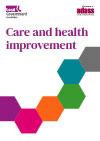These top tips, developed as part of the LGA and ADASS’s work with the Shared Outcomes Fund, seeks to support directors of adult social services and their teams, focusing on the role of social care in supporting people experiencing and recovering from homelessness. It provides top tips under six themes which have been identified as enablers for achieving better outcomes for this cohort, and was co-produced with partner organisations listed in the appendix.
Social care plays a hugely important role in improving the health and wellbeing of communities, and social justice and inclusion is at the heart of this work; ensuring all people are able to access the care, support and safeguards they need.
People at risk of or experiencing homelessness often have complex needs; they may have mental health or substance misuse issues, may have experienced abuse or coercion, may have no recourse to public funds (NRPF), have experienced trauma and multiple disadvantage, and may be reluctant to engage with services. For those who are recovering from the trauma of homelessness it can be a long journey before their quality of life is improved.
In March 2022, a Roundtable event brought together over 30 people with direct experience and / or service responsibility to discuss ways of improving outcomes for people experiencing homelessness, and more specifically the role and contribution of adult social care in this.
That discussion was set in the context of significant events and developments over the last two years; learning from the pandemic and the ‘Everyone In’ campaign on rough sleeping; current work across 17 pilot sites as part of the Shared Outcomes Fund work; a growing movement of peer-led support; updated guidance documents on homelessness and health; forthcoming national policy reform across health and social care; and continuing pressure on resources.
Putting the person experiencing homelessness at the centre and changing the nature of the relationship is critical in all areas of the care and support journey; assessment, co-designing a support plan; commissioning, service delivery. Leading a system for strengths-based approaches enables partners to come together and see the whole person. It is the approach that builds trust, not the process. Strengths-based approaches have not been ‘singled out’ as a specific heading, but are at the core of what we are trying to achieve, and are assumed across all the suggestions in this guide.
Within this already marginalised group we need to address equalities issues and particularly how sex, gender identity, age, race, culture, language etc impact on presentation and engagement with services /assessment – and how this informs the response required.
This document recognises the complexity and diversity of the issue of homelessness. It does not seek to prescribe service models but provides a resource for directors of adult social services to consider their local response.

- Published by:
-
LGA and ADASS
- Reference code:
-
25.207
